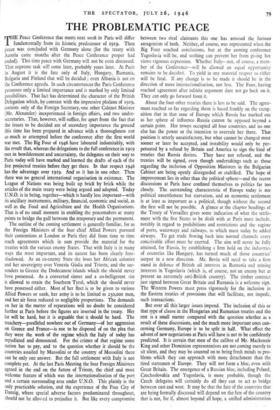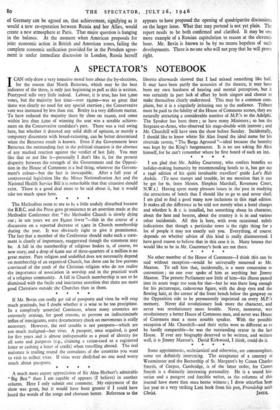THE PROBLEMATIC PEACE
THE Peace Conference that meets next week in Paris will differ fundamentally from its historic predecessor of 1919. Then peace was concluded with Germany alone (for the treaty with Austria came months after the Peace Conference proper had ended). This time peace with Germany will not be even discussed. That supreme task will come later, probably years later. At Paris in August it is the fate only of Italy, Hungary, Rumania, Bulgaria and Finland that will be decided ; even Albania is not on the Conference agenda. In such circumstances the Paris Conference possesses only a limited importance and is marked by only limited possibilities. That fact has determined the character of the British Delegation which, by contrast with the impressive phalanx of 1919, consists only of the Foreign Secretary,-one other Cabinet Minister (Mr. Alexander) inexperienced in foreign affairs, and two under- secretaries. That, however, will suffice, for apart from the fact that the issues to be decided are of secondary importance the ground this time has been prepared in advance with a thoroughness not so much as attempted before the conference after the first world war met. The Big Four of 1946 have laboured indomitably, with the result that, whereas the delegations to the full conference in 1919 met in bewilderment and uncertainty, the delegates on their way to Paris today will have marked and learned the drafts of each of the five projected treaties before they get there. In that respect 1946 has the advantage over 1919. And so it has in one other. Then there was no general international organisation in existence. The League of Nations was being built up brick by brick while the articles of the main treaty were being argued and adopted. Today U.N.O. is in being, together—which is hardly less important—with its ancillary instruments, military, financial, economic and social, as well as the Food and Agriculture and the Health Organisations. That is of no small moment in enabling the peacemakers at many points to bridge the gulf between the temporary and the permanent.
The outline of the coming settlement is generally familiar, for as the Foreign Ministers of the four chief Allied Powers pursued their contentions at London or Paris they did from time to time reach agreements which in sum provide the material for the treaties with the various enemy States. That with Italy is in many ways the most important, and its nature has been clearly fore- shadowed. As an ex-enemy State she loses her African colonies and her sovereignty over Venezia Giulia and Trieste, and she sur- renders to Greece the Dodecanese islands which she should never have possessed. As a converted sinner and a co-belligerent she is allowed to retain the Southern Tyrol, which she should never have possessed either. Most of her fleet is to be given to various Allied Powers or sunk, her army is to be limited to 250,000 men, and her air force reduced to negligible proportions. The demands on her in the matter of reparations will no doubt be considered further at Paris before the figures are inserted in the treaty. Her lot will be hard, but it is arguable that it should be hard. The treachery—paralleled nowhere out of Germany—of her aggression on Greece and France—is not to be disposed of on the plea that they were the work of the regime which the Italy of today has repudiated and denounced. For the crimes of that regime some nation has to pay, and to the question whether it should be the countries assailed by Mussolini or the country of Mussolini there can be only one answer. But the full settlement with Italy is not complete yet. At the last Paris Meeting the four Foreign Ministers agreed in the end on the future of Trieste, the chief and most welcome feature of which was the, internationalisation of the port and a certain surrounding area under U.N.O. This plainly is the only practicable solution, and the experience of the Free City of Danzig, where special adverse factors predominated throughout, should not be allowed to prejudice it. But like every compromise between two rival claimants this one has aroused the furious antagonism of both. Neither, of course, was represented when the Big Four reached conclusions, but at the coming conference Yugoslavia will be, and nothing can prevent her from giving her views vigorous expression. Whether Italy—not, of course, a mem- ber of the Conference—will be allowed an equal opportunity remains to be decided. To yield in any material respect to either will be fatal. If any change is to be made it should be in the direction of more internationalisation, not less. The Four, having reached agreement after infinite argument dare not go back on it. They can only go forward from it.
About the four other treaties there is less to be said. The agree- ment reached so far regarding them is based frankly on the recog- nition that in that zone of Europe which Russia has marked out as her sphere of influence Russia cannot be opposed beyond a certain point. Her troops occupied all four countries, and no one else has the power or the intention to overrule her there. That position is utterly unsatisfactory, but what cannot be changed must sooner or later be accepted, and instability would only be per- petuated by a refusal by Britain and America to sign the kind of treaties that Russia desires. They have not refused, and the treaties will be signed, even though undertakings such as those regarding the inclusion of Opposition Ministers in the Bulgarian Cabinet are being openly disregarded or stultified. The hope of improvement lies in other than the political sphere—and the recent discussions at Paris have confined themselves to politics far too closely. The outstanding characteristic of Europe today is not political unsettlement, but starvation, and an economic settlement is at least as important as a political, though without the second the first will not be possible. A glance at the chapter headings of the Treaty of Versailles gives some indication of what the settle- ment with the five States to be dealt with at Paris must include, notably in regard to prohibitions and restrictions and the regime of ports, waterways and railways, to which must today be added airways. To get trade flowing back into normal channels every conceivable effort must be exerted. The aim will never be fully attained, for Russia, by establishing a firm hold on the industries of countries like Hungary, has turned much of those countries' output in a new direction. Mr. Bevin will need to take a firm stand in defence of British oil interests in Rumania and mining interests in Yugoslavia (which is, of course, not an enemy but at present an extremely anti-British country). The timber contract just signed between Great Britain and Rumania is a welcome sign. The Western Powers must press vigorously for the inclusion in the Eastern treaties of provisions that will facilitate, not impede, such transactions.
But over all this larger issues impend. The inclusion of this or that type of clause in the Hungarian and Rumanian treaties and the rest is a small matter compared with the question whether as a result of these discussions, and the much more important ones con- cerning Germany, Europe is to be split in half. What effect the advent of new negotiations at Paris will have is not to be confidently predicted. It is certain that men of the calibre of Mr. Mackenzie King and other Dominion representatives are not coming merely to sit silent, and they may be counted on to bring fresh minds to pro- blems which they can approach with more detachment than the tired statesmen of Europe. They will not form a bloc, even with Great Britain. The emergence of a Russian bloc, including Poland, Czechoslovakia and Yugoslavia, is more probable, though the Czech delegates will certainly do all they can to act as bridge between east and west. It may be that the fate of the countries that are being formally discussed will depend on the fate of the country that is not, for if, almost beyond all hope, a unified administration of Germany can be agreed on, that achievement, signifying as it would a new co-operation between Russia and her Allies, would create a new atmosphere at Paris. That major question is hanging in the balance. At the moment when American proposals for joint economic action in British and American zones, failing the complete economic unification provided for in the Potsdam agree- ment is under immediate discussion in London, Russia herself appears to have proposed the opening of quadripartite discussions on the larger issue. What that may portend is not yet plain The report needs to be both confirmed and clarified. It may be one more example of a Russian capitulation to reason at the eleventh hour. Mr. Bevin is known to be by no means hopeless of such developments. There is no one who will not pray that he will prove right.































 Previous page
Previous page